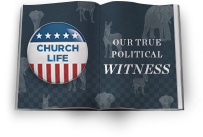American Civil Religion and the Gospel Aren’t the Same Thing
John Foster Dulles (1888–1959) served as Dwight D. Eisenhower’s Secretary of State from 1953–1959. During those years, the Cold War between the United States and the Soviet Union intensified as both nations sought to interpret the other’s motives and goals, while simultaneously attempting to gain the upper hand on the international scene. Dulles was one of the longest serving Secretaries of State in US history, and at the height of his influence, he became one of the most powerful men in the world. President Eisenhower described him in a 1956 diary entry: “There is probably no one in the world who has the technical competence of Foster Dulles in the diplomatic field.” Most Americans of the period agreed—a 1953 poll showed that only 4 percent of Americans had a negative opinion of Dulles. When he died in 1959, the whole world mourned his loss. The effusive eulogies at his funeral led former Secretary of State Dean Acheson to gripe, “The greatest mistake I made was not to die in office.”
As secretary of state, Dulles had an intense commitment to the idea of divine chosenness and mission. He believed God had chosen him for the task in order to reinvigorate the American vision of freedom that had inspired the world at its founding. He also thought the American nation had been chosen for a special task: “Our founders were imbued with a deep sense of mission,” he said in 1947. “Our society of freedom would quickly succumb to the overlordship of others if we renounced a sense of mission in the world.”
Dulles derived his commitment to divine mission from his Presbyterian upbringing in late 19th-century, upstate New York. From the early years of World War II through the end of his life, Dulles was convinced that the United States would ultimately prevail over evil forces like Communism because of their spiritual vitality. Furthermore, he believed that American churches had a pivotal role to play in that endeavor.
Dulles believed that Christianity was an active faith, not merely a set of dogmas for the individual to contemplate, isolated from the world. Churches served as a potent safeguard for freedom because they cast a vision for moral law, love, and brotherhood. They were the source of light in the world, scattering the dark philosophies of atheism and Communism.
But toward the end of his career, and certainly after his death, Dulles’ image began to tarnish. People grew tired of what they saw as a moralizing, self-righteous Puritan. Much of his rhetoric mixed warmongering with high-sounding idealism. Terms he coined—like “brinkmanship” and “massive retaliation”—seemed to needlessly provoke America’s rivals and exasperate its allies. By the end of the 20th century, Dulles’ reputation had soured among Americans to the point at which, according to one 1987 study, he ranked among the five worst Secretaries of State in American history.
A few years after his death, his daughter Lillias Dulles Hinshaw assessed her father’s honed sense of mission. She was herself an ordained Presbyterian minister, and she reckoned that the brand of theology he inherited from his parents was fraught with both strengths and weaknesses: “Its strengths, I think, like in feeling that you are given a certain task to perform. And of course, its weakness lies in the reverse of that, that you may make the mistake of feeling that you are God’s spokesman.”
Dulles’ career as a diplomat serves as a stark warning for Americans who profess Christ because he often failed to maintain this balance between being driven to our task and mistaking ourselves as God’s spokesmen. For example, Dulles often conflated Jesus’ Great Commission with the American mission to spread democracy to all parts of the globe. In 1953, he preached at the 150th anniversary of the founding of his home church in Watertown, New York. Directly referencing the Great Commission, he asserted, “the American people . . . availed of every opportunity to spread their gospel of freedom, their good news, throughout the world.”
In advancing this message, Dulles characterized America in impossible terms. This episode illustrates how he often failed to maintain the healthy perspective of godly vocation that Lillias articulated. Instead, he appropriated to the nation a messianic character.
Dulles’ diplomatic career is defined in the contemporary popular mind by a simplistic, Manichean account of world events. A 2014 biography of the Dulles brothers written by Stephen Kinzer lays sole blame for American involvement in Vietnam at Foster’s doorstep. While I suspect that judgment is unfair, Dulles’ actions leading up to the Gulf of Tonkin resolution of 1964 does demonstrate how a commitment to national mission leads first to hubris and ultimately to humiliation.
WHAT WE CAN LEARN FROM DULLES
What does all this have to do with American Christians? While Dulles’ theological beliefs were liberal, many of his views on the role of the Christian in the world would faithfully align with conservative evangelicals’. He was entirely committed to moral law, the ethical teachings of Jesus, and the indispensability of the church as a force for good in international affairs. Dulles was a sincere patriot with an impeccably moral character; he was devoted to his God as he understood him. He was an affectionate husband, a committed father—and he was dedicated to both his church and his country.
But he also allowed himself to conflate the American mission with the gospel. In so doing, he mistakenly saw America as the hope of the world.
THE CHURCH’S ROLE
Churches have a priestly and a prophetic role in the public square. When the church honors and intercedes on behalf of civic leaders, obeys the law, and seeks the good of others, it serves this priestly role. It stands as a mediator between God and the state. Sometimes, however, the church must raise its voice in warning to the state. When the state’s laws are unjust, when its customs are reprobate, or when its leaders evade the truth, the church must stand and proclaim the truth, no matter the consequences.
At its best, civil religion can instill gratitude for the blessings of any particular nation. It can point citizens to take their nation’s history seriously, with all its glories and failures. By extension, civil religion can also provide examples of past leaders who have been faithful to come alongside the nation when it has been faithful to its ideals, as well as those who’ve called the nation to account when it’s been unfaithful.
But civil religion, when it remains unevaluated and unchecked by the Word of God, can easily run amok. It can present the nation as God, as the savior of the world, as the last best hope on earth. Christians must not be swayed by the siren songs of civil religion, which can so readily offer a false sense of security in ideals, riches, and power. This is true in many places, but especially in America.
When we’re tempted to place our faith in American civil religion to the exclusion of the gospel, let us heed the words of the prophet Jeremiah: “Do not trust in deceptive words, saying, ‘This is the temple of the LORD, the temple of the LORD, the temple of the LORD.’ . . . There is none like You, O LORD; You are great, and great is Your name in might. Who would not fear You, O King of the nations? Indeed it is Your due! For among all the wise men of the nations and in all their kingdoms, there is none like You” (Jer 7:4, 10:6–7).









